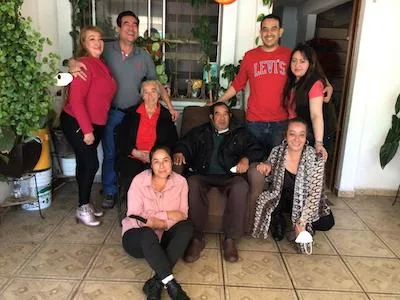Learning English and Volunteering

Volunteering in the community can play an important part in learning language and culture. Current IEP student Luis Fernando Baltazar Paniagua spoke with ILI, sharing his experiences learning English and connecting with his community by getting involved at the Survival Center and the Lathrop Home.
Tell us a bit about yourself
My full name is Luis Fernando Baltazar Paniagua, but I prefer being called just “Fer.” I am from México. I was born in a small town (Andocutín, in the state of Guanajuato) in 1986. I have a big family. I am the seventh child and I am the youngest. I have been with my partner for almost 16 years. I am a Chemical Engineer and also I got an MBA. I have worked for 13 years at Alianza Team (Food Colombian Company), and I work there as Dairy Category Manager for North America. My hobbies are: traveling, spending time with my family, cooking, gardening and also eating.
My goals at this moment of my life are: learning English and getting a Master’s Degree in Food Science in the U.S.
What are your reasons to learn English?
I think I have several reasons: the first one is because nowadays English is very important and a challenge for me. I had been studying for many years and I haven’t done it the way I want. The second reason is because I want to get my master’s degree in Food Science in the U.S., and English is a requirement. Finally, ever since I remember I have wanted to live in the U.S., and one day I will live here many years like my father did, who lived here for 20 years. I have a special connection with the U.S and consequently with English.
Do you prefer learning English online or face to face?
I prefer to study face to face. I took some classes during the COVID-19 and they were good, but to me it works better learning face to face because I think it is the correct way to learn English. Both ways are good if you have enough time to learn it, but if you need to learn quickly it’s better to be present in class.
Which aspects of learning English have you struggled with the most?
I’ve had different issues during my process of learning English. At the beginning listening was the hardest issue, then to memorize irregular verbs, then to understand phrasal verbs, then to learn about idioms in English, and now I have some issues with grammar, specifically passive voice. Overall I think it is part of the process, the deeper the more challenges you will have. I mean it is just a process.
Which aspects of learning English do you find the easiest?
I think the “writing skill” to me is the easiest and after that I think now is “speaking”. I enjoy writing a lot, it makes me feel relaxed, and I can write down my thoughts. Recently I am practicing to improve my “speaking skill” and I think now I have started to enjoy it.
How have you put into practice your English speaking skills in the U.S.?
Well, I started to change my whole life and adapt it to English, for instance I have changed my phone and computer to English. I have tried not to speak Spanish. Every day I have dinner with my host family and during the dinner I speak as much as I can. Now I don´t ask for help in Spanish at stores, I joined the gym and I try speaking with native speakers there, and also I applied to be a volunteer in two places, the Lathrop Home and Survival Center.

What’s your favorite memory of speaking English so far in your life?
Well, so far I have really two, the first one is with my friend Mary. She’s an English teacher retired in Lathrop, and I met with her just to chat about my life and she showed interest in my conversation. It was my first conversation, maybe we talked for approximately 1 hour.
And this week, I have had my largest conversation so far with my friend Frank. He’s a retired chemist, and I talked with him for about 2 hours, and we both enjoyed a lot of conversations because we both shared about our life, work, family and also he gave me some advice in order to choose the best University for me. We lost the sense of time, when we looked at our watches, it was 5:00 p.m.
What inspired you to volunteer at the Lathrop Home and Survival Center?
I had two reasons to apply to these places. The first one because now I have a lot of free time and to me it is unusual because I have worked for 13 years in my job, so I need to keep my brain busy and I thought that these places can help me with that. Also, it is an excellent opportunity to practice English and I can get help. When I can help other people it makes me happy.
I chose the Lathrop Home and the Survival Center because these places represent two very important chapters in my life: “My parents” and “My childhood”. Why? Because, my mother is almost the same age as people in the Lathrop Home and my father was the same age too, and sometimes I see my parents in them. On the other hand, my childhood was a little difficult in order to make money so I think I can help people there and contribute with my work by thanking God for all the good things in my life so far.
Would you recommend others to volunteer? Why?
Totally, becoming a volunteer is the best experience in my life, because you can help people and people can help you. In other words, as American people say, “One hand washes the other.” I mean it is an excellent opportunity to improve your English skills with native speakers and also you can make many friends. It can help you to understand more about American culture, history, etc.
In what ways has your experience at ILI impacted your perspective?
ILI has provided me confidence in myself. It has taught me that making mistakes when you are learning is the best because it is the only way to get it, it doesn’t matter if you make one or hundreds. As my teachers say “just take your time and do it”. And also I think ILI is amazing because you can learn English but not just to pass a test. You are totally immersed in American culture, and this is even more important than other aspects in the process because the more you know about American culture, the easier your path will be in the English Learning Process. In other words, you can know all the grammar, all the rules, all the phonetics but if you don’t get involved in American culture you can´t be successful because it is part of the process.